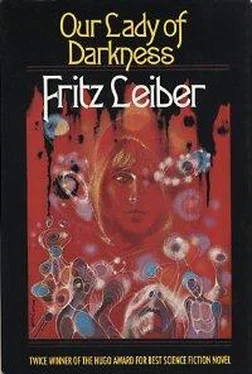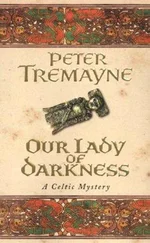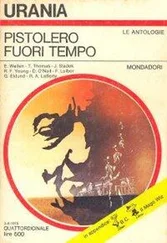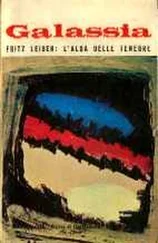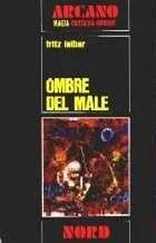“There’s no need,” Franz said, dragging the journal itself out of his side pocket. The binoculars came out with it and dropped to the thickly carpeted floor with a shivery little clash of the broken glass inside.
Byers’s eyes followed them with morbid curiosity. “So those are the glasses that (Take warning, Franz!) several times saw a paramental entity and were in the end destroyed by it.” His gaze shifted to the journal. “Franz, you sly dog! You came prepared for at least part of this discussion before you ever went to Corona Heights today!”
Franz picked up the binoculars and put them on the low table beside his overflowing ashtray, meanwhile glancing rapidly around the room and at its windows, where the gold had darkened a little. He said quietly, “It seems to me, Donaldus, you’ve been holding out, too. You take for granted now that Smith wrote the journal, but in the Haight and even in the letters we exchanged afterwards, you said you were uncertain.”
“You’ve got me,” Byers admitted with a rather odd little smile, perhaps ashamed. “But it really seemed wise , Franz, to let as few people in on it as possible. Now of course you know as much as I do, or will in a few minutes, but… The most camp of clichés is ‘There are some things man was not meant to know,’ but there are times when I believe it really applies to Thibaut de Castries and the paranatural. Might I see the journal?”
Franz flipped it across. Byers caught it as if it were made of eggshell, and with an aggrieved look at his guest carefully opened it and as carefully turned a couple of pages. “Yes, here it is. ‘Three hours today at 607 Rhodes. What a locus for genius! How prosaick!—as Howard would spell it. And yet Tiberius is Tiberius indeed, miserly doling out his dark Thrasyllus-secrets in this canyoned, cavernous Capri called San Francisco to his frightened young heir (God, no! Not I!) Caligula. And wondering how soon I, too, will go mad.’”
As he finished reading aloud, Byers began to turn the next pages, one at a time, and kept it up even when he came to the blank ones. Now and then he’d look up at Franz, but he examined each page minutely with fingers and eyes before he turned it.
He said conversationally, “Clark did think of San Francisco as a modern Rome, you know, both cities with their seven hills. From Auburn he’d seen George Sterling and the rest living as if all life were a Roman holiday. With Carmel perhaps analogous to Capri, which was simply Tiberius’s Little Rome, for the more advanced fun and games. Fishermen brought fresh-caught lobsters to the goatish old emperor; Sterling dove for giant abalone with his knife. Of course, Rhodes was the Capri of Tiberius’s early middle years. No, I can see why Clark would not have wanted to be Caligula. ‘Art, like the bartender, is never drunk’—or really schiz. Hello, what’s this?”
His fingernails were gently teasing at the edge of a page. “It’s clear you’re not a bibliophile, dear Franz. I should have gone ahead and stolen the book from you that evening in the Haight, as at one point I fully intended to, except that something gallant in your drunken manner touched my conscience, which is never a good guide to follow. There!”
With the ghostliest of cracklings the page came apart into two, revealing writing hidden between.
He reported, “It’s black as new—India ink, for certain—but done very lightly so as not to groove the paper in the slightest. Then a few tiny drops of gum arabic, not enough to wrinkle, and hey presto!—it’s hidden quite neatly. The obscurity of the obvious. ‘Upon their vestments is a writing no man may see…’ Oh dear me, no! ”
He resolutely averted his eyes, which had been reading while he spoke. Then he stood up and holding the journal at arm’s length came over and squatted on his hams, so close beside Franz that his brandy breath was obvious, and held the newly liberated page spread before their faces. Only the right-hand one was written upon, in very black yet spider-fine characters very neatly drawn and not remotely like Smith’s handwriting.
“Thank you,” Franz said. “This is weird. I riffled through those pages a dozen times.”
“But you did not examine each one minutely with the true bibliophile’s profound mistrust. The signatory initials indicate it was written by old Tiberius himself. And I’m sharing this with you not so much out of courtesy, as fear. Glancing at the opening, I got the feeling this was something I did not want to read all by myself. This way feels safer—at least it spreads the danger.”
Together they silently read the following:
A CURSE upon Master Clark Ashton Smith and all his heirs, who thought to pick my brain and slip away, false fleeting agent of my old enemies. Upon him the Long Death, the paramental agony! when he strays back as all men do. The fulcrum (0) and the Cipher (A) shall be here, at his beloved 607 Rhodes. I’ll be at rest in my appointed spot (1) under the Bishop’s Seat, the heaviest ashes that he ever felt. Then when the weights are on at Sutro Mount (4) and Monkey Clay (5) [(4) + (1) = (5)] BE his Life Squeezed Away . Committed to Cipher in my 50-Book (A). Go out, my little book (B) into the world, and lie in wait in stalls and lurk on shelves for the unwary purchaser. Go out, my little book, and break some necks!
TdC
As he finished reading it, Franz’s mind was whirling with so many names of places and things both familiar and strange that he had to prod himself to remind himself to check visually the windows and doors and corners of Byers’s gorgeous living room, now filling with shadows. That business about “when the weights are on”—he couldn’t imagine what it meant, but taken together with “heaviest ashes,” it made him think of the old man pressed to death with heavy stones on a plank on his chest for refusing to testify at the Salem witchcraft trial of 1692, as if a confession could be forced out like a last breath.
“Monkey Clay,” Byers muttered puzzledly. “Ape of clay? Poor suffering Man, molded of dust?”
Franz shook his head. And in the midst of all, he thought, that damnably puzzling 607 Rhodes! which kept turning up again and again, and had in a way touched all this off.
And to think he’d had this book for years and not spotted the secret. It made a person suspect and distrust all things closest to him, his most familiar possessions. What might not be hidden inside the lining of your clothes, or in your right-hand trousers pocket (or for a woman, in her handbag or bra), or in the cake of soap with which you washed (which might have a razor blade inside).
Also to think that he was looking at last at de Castries’s own handwriting, so neatly drawn and yet so crabbed for all that.
One detail puzzled him differently. “Donaldus,” he said, “how would de Castries ever have got hold of Smith’s journal?”
Byers let out a long alcohol-laden sigh, massaged his face with his hands (Franz clutched the journal to keep it from falling), and said, “Oh, that. Klaas and Ricker both told me that de Castries was quite worried and hurt when Clark went back to Auburn (it turned out) without warning, after visiting the old man every day for a month or so. De Castries was so bothered, they said, that he went over to Clark’s cheap rooming-house and convinced them he was Clark’s uncle, so that they gave him some things Clark had left behind when he’d checked out in a great tearing hurry. ‘I’ll keep them for little Clark,’ he told Klaas and Ricker and then later (after they’d heard from Clark) he added, ‘I’ve shipped him back his things.’ They never suspected that the old man ever entertained any hard feelings about Clark.”
Читать дальше
